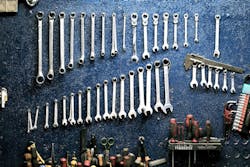SHOP STATS: Integrity Automotive Location: Issaquah, Wash. Operator: Nate Bean Average Monthly Car Count: 330 Staff Size: 12 Shop Size: 7,200 sq. ft. Annual Revenue: $2.45 million
SHOP STATS: Eurotech Car Care Location: Killeen, Texas Operator: Kenny Ware Average Monthly Car Count: 200 Staff Size: 8 Shop Size: 5,500 sq. ft. Annual Revenue: $1.4 million
Like most businesses, many shop owners provide their own specials.
Holiday Sale: $19.99 oil change!
Buy three tires and get the fourth one FREE!
For a limited time, 20 percent off for veterans!
Specials run for a limited time and are meant to promote a service in the shop, usually throwing in a freebie or taking a couple of dollars off the original price. And while it’s fairly common knowledge this ia bad practice, it’s still a persistent issue. Some shop owners think offering a discount will help their business, especially when it comes to emotional discounts—when staff members, managers, and business owners give a discount to make an emotional customer satisfied with a service (either out of sympathy or fear of losing business).
“In today’s world, we feel a customer is going to bad-mouth us and post a review,” Nate Bean, owner of Integrity Automotive in Issaquah, Wash., says. “We have to look at it from a business perspective.”
Like Bean, EuroTech Car Care owner, Kenny Ware, doesn’t believe in emotional discounting. The owner of the Killeen, Texas, shop constantly looks at the facts, figures, and numbers to keep the business on track.
“We all have to give some type of discount, but discounts as a whole devalue your product,” Ware says. “You need to be firm on your prices.”
Bean and Ware provide tips for avoiding emotional discounting altogether.
Set the tone.
All in all, it’s all about showcasing your shop’s value and not emphasizing on price.
“Shops think discounting services upfront is the way to attract customers, but in the long term, the growth and margins will not add up to that and you will attract the wrong customers,” Ware says. “If you give a customer good quality and a good warranty, you are giving them a good customer experience and they usually won’t ask for a discount.”
Ware says if a customer asks for a discount, it’s simply because of the lack of the customer’s perceived value.
“It’s a lot of things a shop does before it gets to the point of continuously discounting service,” Ware says. “I think it starts with your advertising, your branding—not branding yourself as a cheap place. We simply don’t use the word ‘free’ or ‘cheap, and we don’t advertise tons of deals and discounts.”
Clearly communicate with employees.
If your employees don’t see the value in your business, neither will the customer. Ware says employees need to understand where the money goes, what it pays for, and what it took to produce that product.
“At the end of the day, they’ll end up saying, ‘There is no way we can cut the price,’” Ware says. “They have to see the value. If they don’t see the value in what you’re doing, they will cut the price.”
Hear the customer out.
There are customers that come in and can’t pay due to financial hardship, or are outraged by a price.
First things first, hear them out.
“Listen to everything they have to say and stay quiet,” Bean says.
Bean says to find out where they are coming from, let them voice their feelings and tell them what they are thinking or feeling. And if they bring up a discount, he usually follows up with asking the customer, “what is fair to you?” Simply put, a discount might not be what makes the customer happy.
“I think people tend to offer a discount because they think that’s what is going to satisfy the customer that is upset, but it doesn’t resolve the situation,” Bean says. “Offering a discount is just going to put a bandaid on the situation.”
Have empathy, but hold strong.
Bean says if someone can’t afford it, you have to be empathetic, but not sympathetic.
“You have to understand their situation, be patient, and allow them to express their emotions without interrupting them or acting irritated,” Bean says. “Empathy for their situation is important, but taking responsibility for it is not.”
The shop sometimes does pro-bono repairs, but those are only in cases when they come from an organization that reaches out and asks for the shop’s help.
If someone is unable to afford the repairs, Bean’s shop advises them of the option to apply for financing through the companies with which they partner. These companies check credit and determine how much the customer can safely qualify to borrow. And if the customer will not qualify for external financing, then Bean suggest contacting a friend or family member for assistance.
Reward loyalty.
Instead of discounting based on emotions, like encountering an angry customer or one that’s having a difficult time making ends meet, Bean rewards his existing customers. He gives them a rebate after the service has been done and they can redeem that for services in the future. Bean says a new customer hasn’t earned this luxury yet, whereas an existing customer that comes back time and time again, has. He says once you give a new customer that you have never seen before a discount, they will ask for it next time and the time after that. It’s not fair to the other customers who are willing to pay full price.
“The people that tend to ask for discounts are the type of people that are always asking for discounts; those are not my ideal customers,” Bean says. “Once we do this, we are devaluing our business and our industry and the services we offer. I think as an industry we need to think about that.”
Bean says paying for the set price benefits everyone that is quoted, and if his shop could offer a discount to everyone that asks for one, it simply means the shop’s pricing is too high.
“I want to make sure I am providing for the health of my business, the income of my staff, and for the customers as well,” Bean says. “As soon as I discount a repair, I am compromising the value of the work we do and the value of our business, our company, and the industry.”

